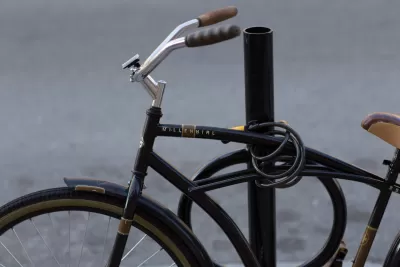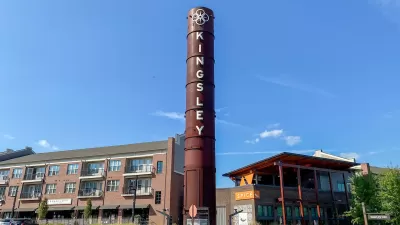As more young people express a preference for suburban life, Alan M. Berger gives us a vision of tomorrow's suburbs: smart and sustainable, but still spread out.

As we've seen recently, the younger generation's love affair with urban living may not last. Of millennials, Alan M. Berger writes, "They are continuing to migrate to suburbs. According to the latest Census Bureau statistics, 25- to 29-year-olds are about a quarter more likely to move from the city to the suburbs as vice versa; older millennials are more than twice as likely."
Berger, a professor of landscape architecture and urban design at MIT, argues that younger suburbanites "want breathing room but disdain the energy wastefulness, visual monotony and social conformity of postwar manufactured neighborhoods."
Buzzing with smart tech and attuned to the environment, Berger's suburb of tomorrow cuts down on some its predecessors' waste, opening up better spaces for community life. "In sustainable new suburbs, house and lot sizes are smaller — in part because driveways and garages are eliminated — paving is reduced up to 50 percent and landscapes are more flexible."
But this is still a car-dependent (or drone-dependent) vision. And Berger isn't afraid to imply that he knows the truth about what millennials, as a monolithic group, want.
FULL STORY: The Suburb of the Future, Almost Here

Maui's Vacation Rental Debate Turns Ugly
Verbal attacks, misinformation campaigns and fistfights plague a high-stakes debate to convert thousands of vacation rentals into long-term housing.

Planetizen Federal Action Tracker
A weekly monitor of how Trump’s orders and actions are impacting planners and planning in America.

San Francisco Suspends Traffic Calming Amidst Record Deaths
Citing “a challenging fiscal landscape,” the city will cease the program on the heels of 42 traffic deaths, including 24 pedestrians.

Defunct Pittsburgh Power Plant to Become Residential Tower
A decommissioned steam heat plant will be redeveloped into almost 100 affordable housing units.

Trump Prompts Restructuring of Transportation Research Board in “Unprecedented Overreach”
The TRB has eliminated more than half of its committees including those focused on climate, equity, and cities.

Amtrak Rolls Out New Orleans to Alabama “Mardi Gras” Train
The new service will operate morning and evening departures between Mobile and New Orleans.
Urban Design for Planners 1: Software Tools
This six-course series explores essential urban design concepts using open source software and equips planners with the tools they need to participate fully in the urban design process.
Planning for Universal Design
Learn the tools for implementing Universal Design in planning regulations.
Heyer Gruel & Associates PA
JM Goldson LLC
Custer County Colorado
City of Camden Redevelopment Agency
City of Astoria
Transportation Research & Education Center (TREC) at Portland State University
Jefferson Parish Government
Camden Redevelopment Agency
City of Claremont





























